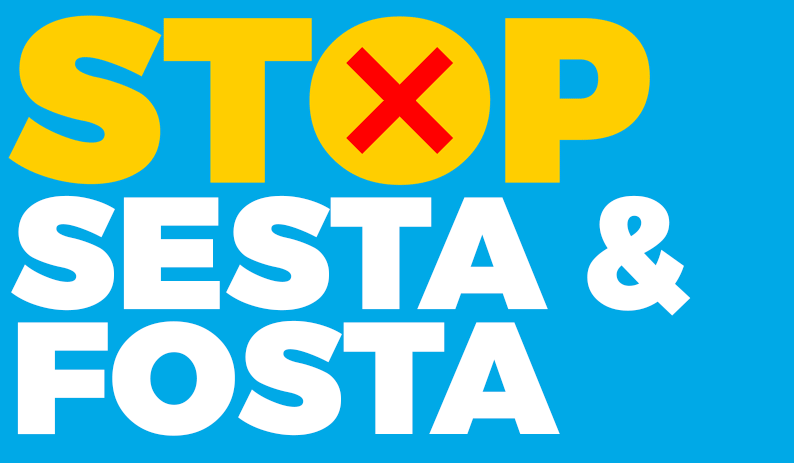FOSTA-SESTA (Fight Online Sex Trafficking Act-Stop Enabling Sex Traffickers Act) is a law that was implemented in the United States by the controversial former Republican President Donald Trump and a U.S. Congress that was dominated by social conservatives and anti-web technology progressives as a means to counter online sex trafficking and non-consensual content ostensibly.
While the FOSTA-SESTA intends to combat sex trafficking and provide more protective measures for victims of CSAM and CSEM, the law has proven to be highly ineffective. It has consequently stifled free speech on the internet among sex workers and adult content creators.
The Origins of FOSTA-SESTA
FOSTA-SESTA developed into law, having derived from the ongoing controversies related to efforts to reform Section 230 of the Communications Decency Act of 1996. Section 230 was passed in 1996 with the remainder of the Communications Decency Act as the first-of-its-kind law to try and shield minors from age-restricted content, including criminal obscenity and indecency, on the internet.
It Starts With Section 230
The law made it a crime to communicate obscene material over the internet if minors were to use it. However, the definition of obscene in the law is broad and could be interpreted by some juries to cover constitutionally-protected forms of sexual expression, including consensual porn content.
Dozens of civil society organizations and civil libertarians noted that the design of the law directly violated the First Amendment of the U.S. Constitution. This was later confirmed in the benchmark Supreme Court case of Reno v. American Civil Liberties Union (ACLU). The majority of the high court ruled that the Communications Decency Act of 1996 significantly limited the First Amendment on the internet and ruled that much of the law cannot be equitably enforced. Section 230 was retained by the court, however. Section 230 is regarded as the “First Amendment of the internet,” based on how the high court and the ensuing body of case law interpret its safe harbor provisions that do cover web platforms. As a reminder, Section 230, in its current form, immunizes the vast majority of web platforms from the liability of third parties who use their platforms to publish their content.
Adult entertainment companies rely heavily on the safe harbor in Section 230 to self-regulate their platforms and to prevent illegal activity, including the posting and distribution of CSAM, all content piracy, other intellectual property rights violations, and non-consensual porn (e.g., “revenge porn”).
Criticism of Section 230 Leads to Intervention
It is the position of Section 230 evangelists to note that the internet as we know it today would not exist without this law. There is a plethora of evidence to indicate that they are correct. Without the fear of constant liability, companies that build social media platforms or e-commerce marketplace software are free from the harms visited upon them by external third parties (the users) who do violate the platform’s terms and conditions and the law, if applicable. But, as the internet matured, Section 230 has been criticized by a growing number of conservative and progressive lawmakers who view the safe harbor shields platforms from accountability for permitting those who wish to cause harm on the internet to do so openly without content moderation or banning.
Anti-pornography groups, such as the notorious National Center on Sexual Exploitation (NCOSE), joined many right-wing critics during the tenure of Trump and the rise of the new populist right.
Section 230 Moderation Against Trump and His Allies
For instance, one right-wing criticism of Section 230 of the Communications Decency Act of 1996 was when pre-Elon Musk Twitter banned far-right talk show host and provocateur Alex Jones from the platform for terms of service and hate speech code violations. Republicans and the supporters of Alex Jones started trumpeting that Twitter – and eventually big tech in general – had an avowed anti-conservative bias and sought to censor controversial right-wing viewpoints.
Another case saw Donald Trump’s tweets in later years get labeled as misinformation and disinformation for conspiracy theories related to the 2020 election and for advocating violence which led to the violent and deadly storming of the U.S. Capitol Building by several far-right militias and other Trump supporters. Section 230 was used by Twitter at the time and Facebook to ban Donald Trump from their platforms to further curtail such violence.
Anti-Porn Groups and Section 230
NCOSE and other groups like it joined in the criticism. NCOSE has a history of being affiliated with the religious right and was previously known as Morality in Media – led by conservative Catholics.
NCOSE criticized the Supreme Court in Reno v. ACLU at the time for bowing to the civil libertarians. NCOSE never let go of this failure and lobbied with other right-wing groups to pass FOSTA-SESTA. Groups collectively argued that Section 230 allows websites that host adult content, escort classifieds, and other means of communication for online sex work to enjoy unaccountability from potential legal and criminal violations. FOSTA-SESTA was brought to the mainstream by religious right-wing and anti-porn feminist groups who claim that consensual, regulated porn production ostensibly leads to vast sexual exploitation and crime. This is not the truth, especially when the industry itself is mandated to report openly to the Department of Justice and public agencies.
Critical Viewpoints of FOSTA-SESTA
One of the criticisms of the law is that it has not effectively targeted sex traffickers but instead has had a chilling effect on free speech and marginalized communities, like consenting sex workers. After it was passed and adopted by President Donald Trump in 2018, the law’s impact has led to the shutdown of several websites and online platforms that sex workers used to screen clients, share information about safe working conditions, and support each other. These platforms also provided a sense of community, solidarity, and safety for sex workers, and their closure has left many in the sex work communities feeling more vulnerable and isolated. Online sexual censorship does that. Many have had to resort to working on the streets, where their lives are constantly in danger.
Court Challenges
Some groups representing the adult entertainment industry and civil society have challenged the law since its adoption in 2018. One notable example is the ongoing litigation against FOSTA-SESTA brought forth by a suing class led by the nonprofit Woodhull Freedom Foundation, among others.
POLITICO reported in January 2023 that the federal D.C. Circuit Court of Appeals is poised to strike down a provision in FOSTA-SESTA that cracks down on sex worker advertising. The Woodhull Freedom Foundation, with the Internet Archive and Human Rights Watch, have openly maintained their legal fight to prove that not only is FOSTA-SESTA an unconstitutional law in its entirety, but the law has chilled free expression and has harmed more than sex workers.
A Legislative Response
Despite the legal challenges, one lawmaker has a noteworthy response to the negative impacts of FOSTA-SESTA. Rep. Ro Khanna, D-Calif., has introduced the SAFE SEX Workers Study Act to study the social, economic, and legal effects on FOSTA-SESTA since its passage during the Trump era.
Rep. Ro Khanna said in a 2022 press release, “I’ve heard from sex workers who have experienced increased physical and sexual violence after being pushed off online platforms and forced onto the streets to find clients. Despite this, there has still never been a federal study on how shutting down websites impacts people who rely on consensual, transactional sex.” He is expected to introduce this bill again in 2023, even with a House of Representatives held by the post-Trump Republicans.
Khanna refers to a report by the Government Accountability Office that found that the Department of Justice has only used it a few times since its passage. And the prosecutions are very limited. Michael McGrady, a friend of Adult Site Broker and a contributing writer at YNOT.com, wrote that the report indicates “that federal prosecutors have barely utilized the law since its passage.”
Related Content:
What Is Section 230, And Why Should I Care?
How A New Congress Could Impact Adult Site Owners
We at Adult Site Broker hope you’ve enjoyed this post. Reach out to us if you have any questions.



